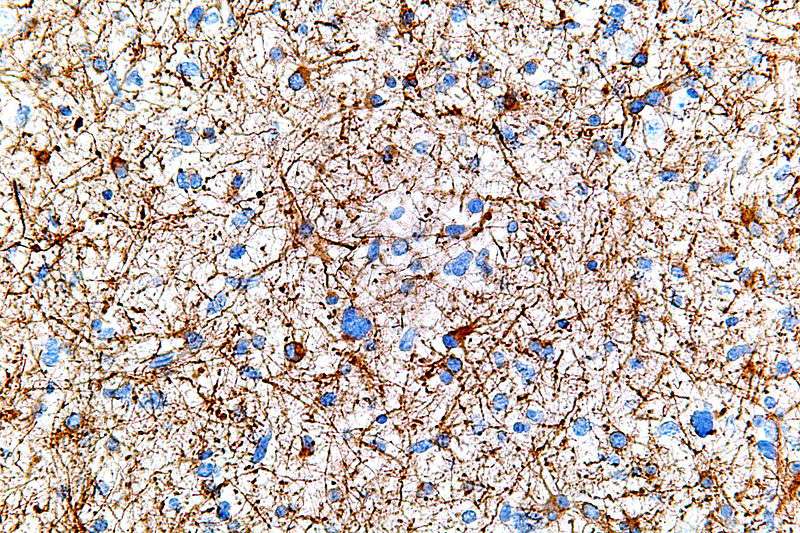Methionine restriction may improve aggressive brain cancer prognosis in children

Some brain cancers are easier to treat than others. Many solid tumors can be carefully excised by a skilled neurosurgeon, but others, such as diffuse midline gliomas, or DMGs, are much trickier. Children who have been diagnosed with a DMG tumor are projected to live for less than a year.
New research from the University of Pittsburgh School of Medicine points to a potentially better, non-invasive way to treat these tumors in the future.
In a paper published in Nature Cancer today, physician-scientists from Pitt and UPMC Children's Hospital of Pittsburgh discovered that DMG tumors are uniquely dependent on methionine—an amino acid that humans must receive from food. Developing drugs that specifically target methionine-processing machinery in cancerous cells in the brain but not in the rest of the body might pave way for new non-invasive treatments.
"The Achilles's heel of these tumors is that they are rapidly growing and use a lot of nutrients," said Sameer Agnihotri, Ph.D., assistant professor of neurological surgery at Pitt. "Combining metabolic approaches—changes in diet—with next-generation scientific tools might become a way of harnessing our understanding of how nutrient needs of cancer cells differ from normal cells and lead to more effective personalized cancer therapies in the future."
Brain cancer is the second-most common type of cancer in children, surpassed only by leukemia. But unlike leukemia, which has relatively high survival rates thanks to the medical advancements of the last century, brain cancers represent the No. 1 cause of cancer deaths among children. And, of all brain cancers, DMGs are especially deadly.
Midbrain, where DMG tumors often arise, is a critical connection point linking the brain cortex—an area responsible for complex information processing, logical reasoning and thinking—to the spinal cord. Because those tumors are buried deep inside the brain, surgery is often impossible, and they often don't respond to radiation therapy.
"None of the standard chemotherapy approaches that have been successfully tested in adults were a home run in children with this type of cancer," said Agnihotri. "Pediatric cancers are so distinct and different from adults. In young children, brain tumors grow just as the brain is trying to develop normally, so anticancer therapies can have many side effects."
Fortunately, DMG cells may have a special vulnerability that could be exploited for therapeutic benefit. Careful analysis of those cells' genetic code revealed that they have a unique feature—a mutation in proteins that provide structural support to the DNA—that makes them particularly vulnerable to methionine depletion.
Methionine is one of nine amino acids—building blocks that our bodies use to make proteins—that scientists call "essential." Because the human body lacks the machinery to make methionine from scratch, consuming methionine-rich foods, such as poultry and legumes, is the only way to replenish its reserves.
To find out whether manipulating cancer cells' diet can make DMG tumors grow slower, researchers put those cells in a Petri dish and recorded their behavior while depleting one nutrient at a time. When scientists depleted the cells of methionine, the picture was clear—the cancer cells' growth was dramatically repressed.
Researchers also showed that removing a key enzyme involved in converting methionine into other components indispensable for many cellular functions stymies cancer cells' growth and increases survival of mice with aggressive DMG cancers. In a separate experiment, when sick mice were put on a methionine-restricted diet, their life expectancy rose by nearly 50%.
The group is now busy developing a proposal for a clinical trial to test drugs targeting methionine metabolism in people. They are optimistic that the trial's launch won't be too far in the future.
"Everyone in the field of brain cancer, scientists and neurosurgeons alike, are often asked if there is a diet change that a patient can take to aid their recovery. Small steps like these give patients and their families a sense of control and optimism," said Agnihotri. "The answer to that question is complicated. A diet change alone probably won't have a dramatic effect, but maybe it can complement other therapies and make them more effective."
More information: Stephen Mack, Loss of MAT2A compromises methionine metabolism and represents a vulnerability in H3K27M mutant glioma by modulating the epigenome, Nature Cancer (2022). DOI: 10.1038/s43018-022-00348-3. www.nature.com/articles/s43018-022-00348-3


















